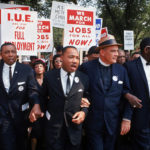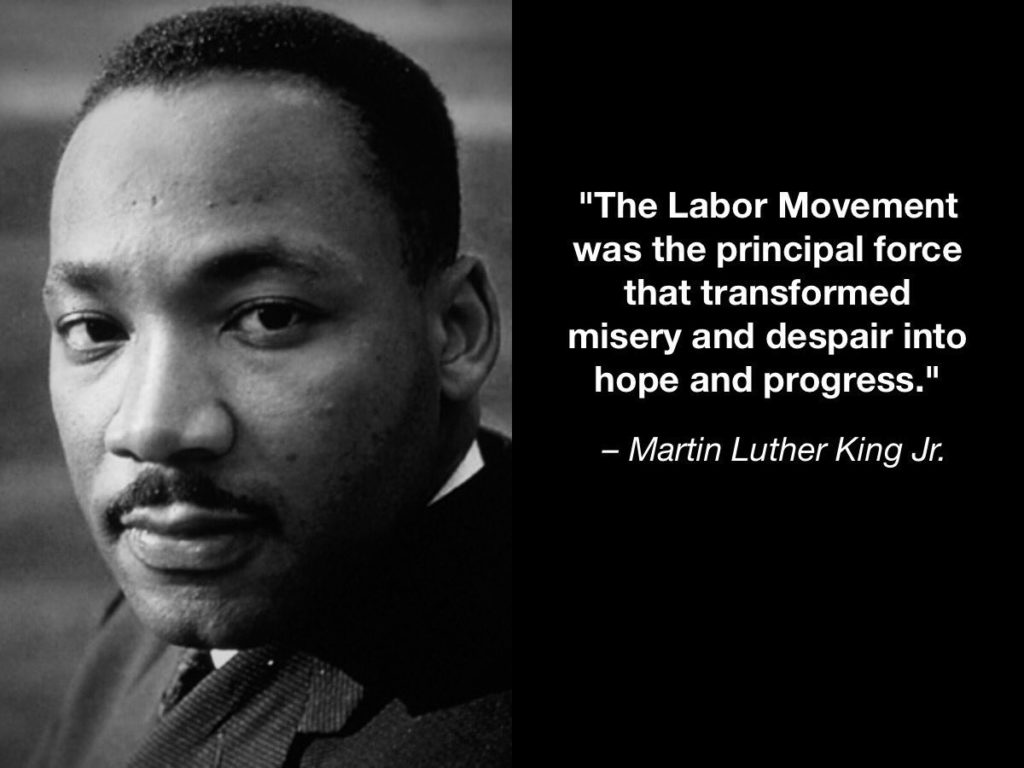
MLK Jr. on the linked fate of the civil rights & labor movements
“As we celebrate Labor Day […], let’s remember that [Martin Luther] King [Jr.] was committed to building bridges between the civil rights and labor movements.

Invited to address the AFL-CIO’s annual convention in 1961, King observed:
Our needs are identical with labor’s needs: decent wages, fair working conditions, livable housing, old-age security, health and welfare measures, conditions in which families can grow, have education for their children, and respect in the community. That is why Negroes support labor’s demands and fight laws which curb labor. That is why the labor-hater and labor-baiter is virtually always a twin-headed creature spewing anti-Negro epithets from one mouth and anti-labor propaganda from the other mouth.
Martin Luther King, Jr., 1961
He added:
The labor movement did not diminish the strength of the nation but enlarged it. By raising the living standards of millions, labor miraculously created a market for industry and lifted the whole nation to undreamed of levels of production. Those who today attack labor forget these simple truths, but history remembers them.
Martin Luther King, Jr., 1961
Several major unions reciprocated King’s support. When he was jailed in Birmingham for participating in civil disobedience, it was Walter Reuther, the charismatic leader of the United Auto Workers (UAW) union, who paid his bail.
[…] Several major unions, especially the UAW and the International Ladies Garment Workers, had donated money to civil rights groups, supported the sit-ins and freedom rides, and helped organize the massive 1963 March on Washington, where King delivered his famous ‘I Have a Dream’ speech.
We often forget that its official name was the March on Washington for Jobs and Freedom and that its manifesto called on Congress not only to pass a civil rights bill but also ‘a national minimum wage act that will give all Americans a decent standard of living.’ The manifesto pointed out that ‘anything less than $2.00 an hour fails to do this.’
In 1963, the minimum wage was $1.25 — the equivalent of $9.97 in today’s dollars. A $2 minimum wage in 1963 would be $15.95 an hour today.
In the 1960s, the sit-ins (a tactic adopted from workers’ sit-down strikes in the 1930s), Freedom Rides, mass marches, and voter registration drives eventually led Congress to enact the Civil Rights Act of 1964 and the Voting Rights Act of 1965. King was proud of the civil rights movement’s success in winning the passage of those important laws. But he realized that neither law did much to provide better jobs or housing for the large numbers of low-income African Americans in the cities and rural areas. He recognized the limits of breaking down legal segregation.
‘What does it profit a man to be able to eat at an integrated lunch counter if he doesn’t earn enough money to buy a hamburger and a cup of coffee?’ King asked.
Negroes are not the only poor in the nation. There are nearly twice as many white poor as Negro, and therefore the struggle against poverty is not involved solely with color or racial discrimination but with elementary economic justice. […] there must be a better distribution of wealth within this country for all God’s children. There is nothing but a lack of social vision to prevent us from paying an adequate wage to every American whether he [or she] is a hospital worker, laundry worker, maid, or day laborer.’
Martin Luther King, Jr.
In a speech to the Illinois AFL-CIO in 1965, King said:
The two most dynamic movements that reshaped the nation during the past three decades are the labor and civil rights movements. Our combined strength is potentially enormous. We have not used a fraction of it for our own good or for the needs of society as a whole. If we make the war on poverty a total war; if we seek higher standards for all workers for an enriched life, we have the ability to accomplish it, and our nation has the ability to provide it. lf our two movements unite their social pioneering initiative, thirty years from now people will look back on this day and honor those who had the vision to see the full possibilities of modern society and the courage to fight for their realization. On that day, the brotherhood of man, undergirded by economic security, will be a thrilling and creative reality.
Martin Luther King, Jr., 1965
King warned about the ‘gulf between the haves and the have-nots’ and insisted that America needed a ‘better distribution of wealth.’
Thus, it was not surprising that Memphis’ civil rights and union leaders invited King to their city to help draw national attention to the garbage strike.
[…] King came back to Memphis on Wednesday, April 3 to address a rally to pressure city officials to negotiate a compromise solution to the strike. That night, at the Mason Temple — packed with over 10,000 black workers and residents, ministers, white union members, white liberals, and students — King delivered what would turn out to be his last speech. He emphasized the linked fate of the civil rights and labor movements.
